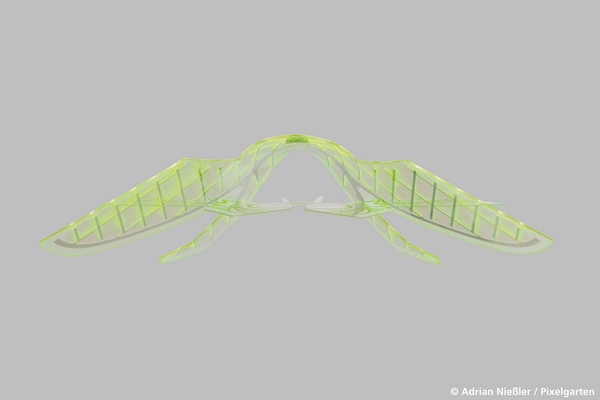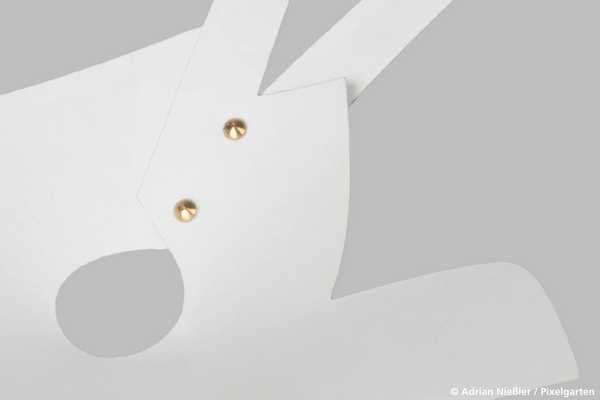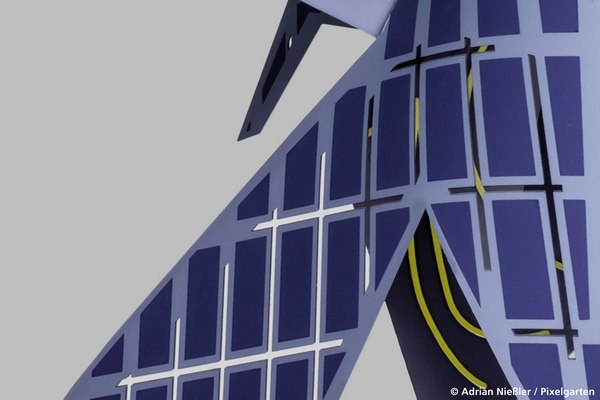The Fraunhofer Institute for Organic Electronics, Electron Beam and Plasma Technology FEP, Fraunhofer Institute for Applied Polymer Research IAP, Organic Electronics Saxony (OES) and Mareike Gast Industrial Design present the “Insect Project” as a highlight of flex+ Open Innovation at the OES LOPEC 2016 booth (Hall B0, Booth 320) and at the joint Fraunhofer booth (ISE, IAP, ISC, IVV) in Munich, Germany, April 6 – 7, 2016.
The goal of the partners in the Project flex+ Open Innovation, funded by the German Federal Ministry of Education and Research (BMBF) under the Zwanzig20 (“Twenty20”) Partnership for Innovation program, is to transfer the enormous potential of flexible electronics into applications. Through the “Insect Project”, they aim to communicate the advantages of flexible electronics and spark ideas for new products.
 |
|
Fraunhofer Institute's OLED insects from The Insect Project. (All photos courtesy of Adrian NieBier/Pixelgarten) |
In the framework project flex+ Open Innovation a common strategy to tap the market for flexible electronics is developed. An Open Innovation network with players from industry, science, politics and society is established to promote close collaboration between partners toward new applications.
The “Insect Project” at LOPEC 2016 demonstrates the high functional potential of the technology and its feasibility. It is highlighting a range of functionalities without indicating any particular product. This overall concept designed by Mareike Gast and Kathi Stertzig is based on a diverse and fascinating class of species – insects whose characteristics were implemented technologically to let your imagination run free.
 |
The ”Night Fly” is adorned with a luminous pattern. To implement it, Fraunhofer FEP processed OLED on flexible substrates and finished it graphically with screen-printing in a second step. The three-dimensional body of this fly is formed through a simple sticking together with an additional film. “The curved shape of the head and wing parts impressively demonstrates the flexibility of OLEDs”, explains fascinated Christian Kirchhof, flex+ project coordinator from Fraunhofer FEP. “Extremely thin conductors are provided for electrical contacts that simultaneously serve as structural supports for the fly.”
Fraunhofer IAP has developed a „Moon Moth“ in the „Insect Project“. The moth uses a unique folding and paper lamination. The wire pattern shines through paper. “In 'Moon Moth' two technologies of flexible electronics are combined”, explains Dr. Armin Wedel from Fraunhofer IAP.
Let luminous and light “insects” enchant you and captivate you in the world of flexible organic electronics!
 |
About flex+ Open Innovation:
flex+ Open Innovation is a Zwanzig20 (“Twenty20") Forum project sponsored by the German Federal Ministry of Education and Research (BMBF) under the “Twenty20 – Partnership for Innovation” program.
Funding level: approx. EUR 1 million (US $ 11.41 million)
Project duration: 24 months
Project reference: BMBF-03ZZF31
Project partners: Fraunhofer FEP, Fraunhofer IAP
Cooperation partners: OES, Mareike Gast Industrial Design
Project coordinator: Fraunhofer FEP





 CN
TW
EN
CN
TW
EN








